#Second Polish Republic
Text
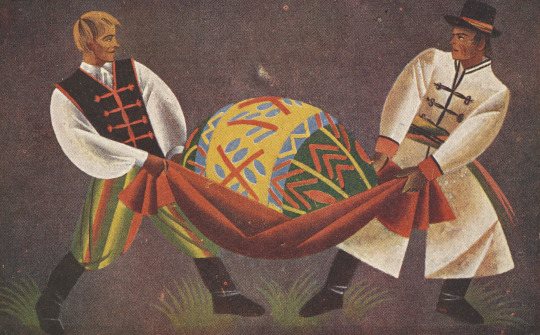
Kartka wielkanocna (1937).
141 notes
·
View notes
Text

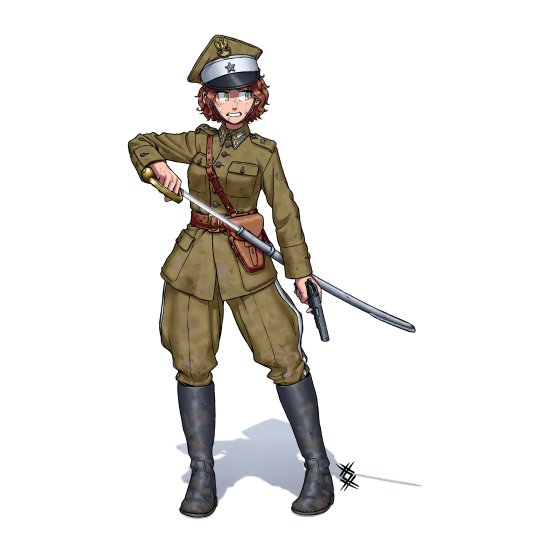
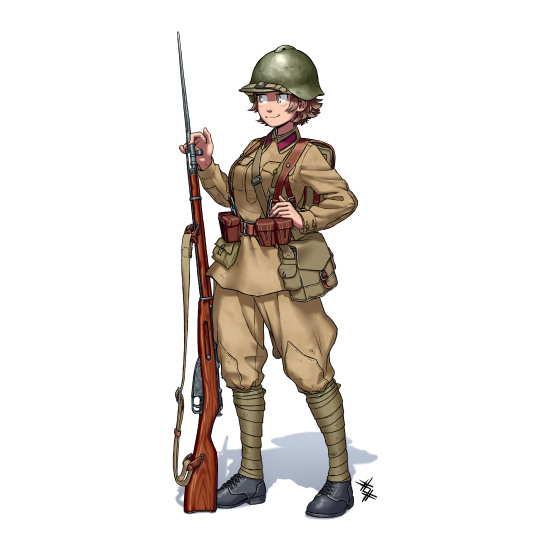
WW2 Campaigns uniform comparison series part 4!
#Ostwind Projekt#toxic yuri#USSR#Second Polish Republic#Poland#Small Arms#Mosin Nagant#blades#Vis 35#Wz. 35
14 notes
·
View notes
Photo
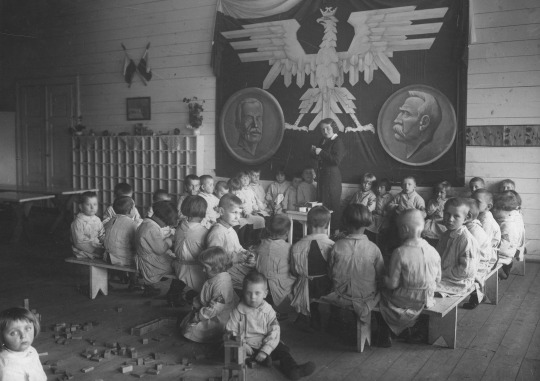
Polish children in a kindergarten operated by the mutual aid association Rodzina Kolejowa (Railway Family). The wall is decorated with a tapestry depicting a stylised White Eagle and portraits of President Ignacy Mościcki and Marshal Józef Piłsudski (c.1935, Radom).
#photography#poland#polska#second polish republic#ii rzeczpospolita#radom#józef piłsudski#ignacy mościcki#white eagle#orzeł biały
28 notes
·
View notes
Text
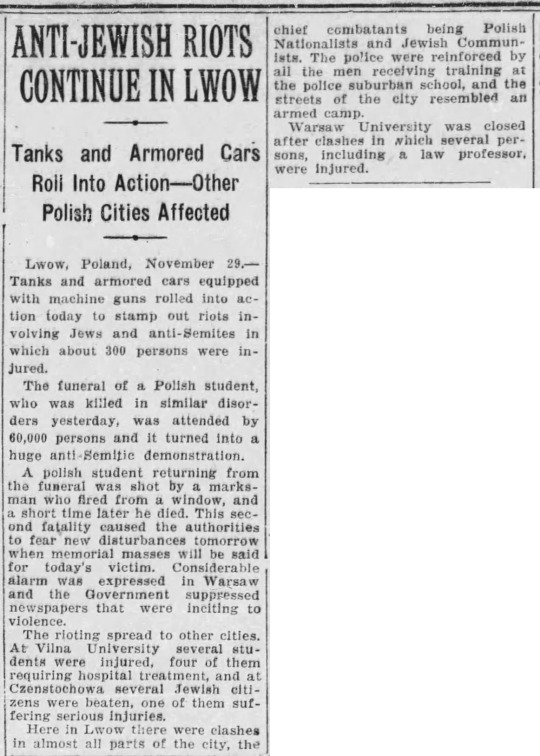
“ANTI-JEWISH RIOTS CONTINUE IN LWOW,” Montreal Gazette. November 30, 1932. Page 2.
----
Tanks and Armored Cars Roll Into Action
----
Other Polish Cities Affected
----
Lwow, Poland, November 29. Tanks and armored cars equipped with machine guns rolled into action today to stamp out riots involving Jews and anti-Semites in which about 300 persons were injured.
The funeral of a Polish student, who was killed in similar disorders yesterday, was attended by 60,000 persons and it turned into a huge anti-Semitic demonstration.
A Polish student returning from the funeral was shot by a marksman who fired from a window, and a short time later he died. This second fatality caused the authorities to fear new disturbances tomorrow when memorial masses will be said for today's victim. Considerable alarm was expressed in Warsaw and the Government suppressed newspapers that were inciting to violence.
The rioting spread to other cities. At Vilna University several students were injured, four of them requiring hospital treatment, and at Czenstochowa several Jewish citizens were beaten, one of them suffering serious injuries.
Here in Lwow there were clashes in almost all parts of the city, the chief combatants being Polish Nationalists and Jewish Communists. The poflce were reinforced by ail the men receiving training at the police suburban school, and the streets of the city resemble an armed camp.
Warsaw University was closed after clashes in which several persons, including a law professor, were injured.
#lvov#lviv#warsaw#riots#antisemitism#antisemitic riots#polish nationalism#second polish republic#polish history#interwar period
7 notes
·
View notes
Text
really worried that my village is going to go down a track of racism now.
A bunch of middle eastern dudes bought an old house near the church last year.
last week they were caught stealing from other peoples gardens.
Yesterday one of them straight up threw a rock the size of your average bar of soap at the head of a girl that was just chilling on the stepts of the church (they‘re a popular hangout spot for the youth in our village) during the anniversary celebration of our volunteery firefighters. There were several eye witnesses, the girl is now in the hospital in critical condition.
My village allready has an issue with racism towards eastern folks and I feel like this is only going to make it worse because like 80% of the people here were born during or right after ww2 and don‘t really seem to understand that every culture has some bad apples and just because this guy is an absolute ass that doesn’t mean that everyone from his culture is.
The guy is most likely going to get a charge with attempted manslaughter.
#you have no idea how common the word schlawacke is in my village#It‘s a derogatory term for everyone from east of germany#the term stems from the name of the region slowakia#and is pronounced shla-wa-keh for those who wanna know what it sounds like so you can call out the racism when you hear it#my dad uses it so commonly and it honestly disgusts me#I‘ve literally left the dinnertable because he always gets so angry when talking about easterners#my best friend is russian-german in second generation for fucks sake#my buddy with the fluffy cars has russian roots too#my other homie that I go to medieval markets with all the time has roots in the Sudeten mountains#which are in the czech republic#my friend linh (the one who does all these cool cosplays) is vietnamese#same goes for my little buddy that I always take to annotopia and prideparades#he‘s basicly discriminating against the majority of my friendgroup without even realizin it#and our own ancestors too considering that on the 1400 our family literally came to fermany from poland#my last name is a polish city for fucks sake
2 notes
·
View notes
Text
finally figured out why Bohdan never shows up in all the fuckin' fancy Pedigrees the Noble & Most Ancient Zahorski Line commissions like all szlachta families and it is because his father disowned him in the Krakow Social Democrat newspaper. Embarrassing

#bohdan tag#this guy is such a failson it beggars belief#i almost have affection for him?#also i think i figured out the woman he left stefania for#her name is zofia zak!#i figured it out through. the kolo ziemianek movement comma the president of the polish maritime league who was also#the vice chairman of the national bank during the second republic comma the member of PPS who was involved in the same#political stuff as bohdan's dad & was related to wladyslawa weychert-szymanska comma#and really a lot of digitized records re: business ownership and silent partners#also i learned a lot about poland's plans for baltic sea trade during the second republic#bohdan was stirring shit up#also there was surprise endecja again but there is always surprise endecja
7 notes
·
View notes
Note
Is there anything you're working on right now?
It would be less of a problem, Savage thinks darkly, if this particular pirate was a little stupider or a little more unpleasant. Self-declared pirate kings being charming enough to wriggle out of years of being hunted by the Republic is incredibly annoying and inconvenient, especially when they enjoy tormenting Savage in particular.
“Did you get bigger since last time?” the pirate on his right arm asks, cheerfully enough. He’s Human, with a Stewjoni accent and dark hair, and Savage levels a dark look at him, more than ready to get all of this over with. It makes the man grin, and he warns, “Watch your horns,” as he propels Savage through another doorway and out into the main area of the ship.
Of course, Savage clips his horns on the edge of the door, staggers, and only just keeps from falling, landing on one knee in the middle of a cleared space. There's a chair in front of him that looks like it was stolen from a Telosian senate building, and Savage would never set Xanatos on anyone, but if anyone deserved the wrath of Qui-Gon’s second padawan, it would be this man. Grimly, Savage flicks a look over tall, polished boots, lazily crossed at the ankle, and then raises his head, meeting blue-green eyes with a deep scowl.
“Kenobi,” he says flatly.
Obi-Wan grins, pleased with himself in a way that makes Savage want to bite him. “Knight Opress, what brings you back to my humble ship after all this time? I thought that last time you’d declared your intent to never set foot on it again. Is your heart so fickle?”
“You ambushed us,” Savage says, deeply annoyed. “As we approached the hyperspace breakwater. I'm not here by choice.”
“Now that’s just hurtful,” Obi-Wan says, and he’s still smiling. “It’s been so long, and that’s all you can say to me, Savage?”
65 notes
·
View notes
Text
My next post in support of Ukraine is:
Next site, the city of Kamianets-Podilskyi (Кам'янець-Подільський) in Khmelnytskyi Oblast. Its name is derived from an Old Slavic word, kamin, which means 'stone' and from the historic region known as Podilia. The literal meaning of the name is 'The Stones of Podilia.' It's believed by some historians that there was an earlier city built on the same spot by the Dacians, an ancient people from what is now Romania, Moldova, and parts of Ukraine. The earliest mention of the current city is from 1062. In 1241, it was destroyed by the Mongols. In 1352, it came under Polish rule. The castle in the city (which I posted about earlier in the🧵) was expanded by the Polish kings to guard against the Ottoman & Tatar invasions. Though, in 1672, the city did become part of the Ottoman Empire for a short while. It was returned to Polish rule in 1699. In 1793, after the Second Partition of Poland, the city became part of the "russian" empire. During WWI, it was occupied by Austria-Hungary in 1915. When the "russian" empire collapsed in 1917, it came under the control of the Ukrainian People's Republic and was chosen as its capital when Kyiv was captured by the Bolsheviks. In 1921, it came under the control of the soviet union until 1991, when Ukraine declared its independence.
#StandWithUkraine
#СлаваУкраїні 🇺🇦🌻

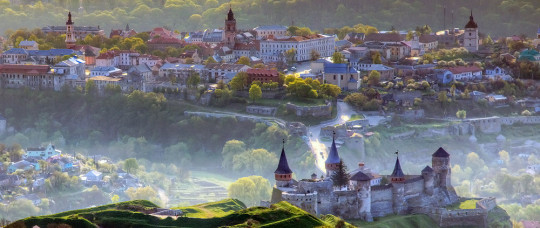
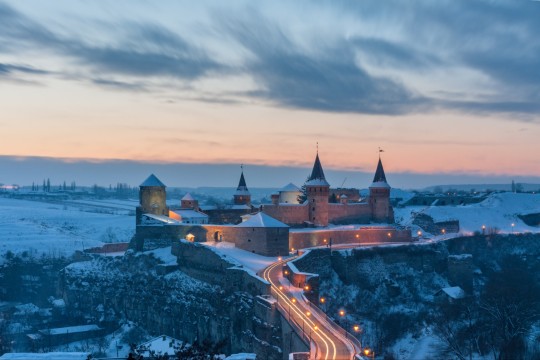
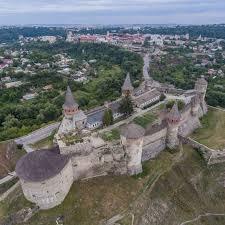
74 notes
·
View notes
Photo
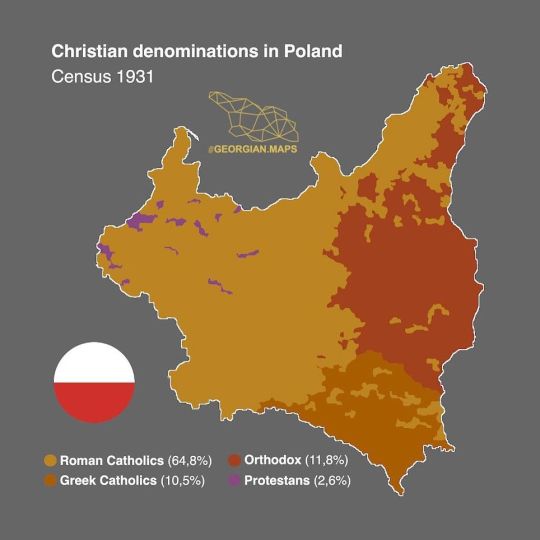
Christian denominations in the Second Polish Republic, 1931.
by georgianmaps
71 notes
·
View notes
Text
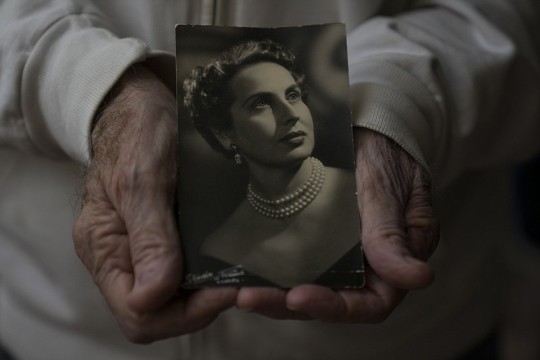
It was a "small" act.
But, at the time, she didn’t realize she was making a life-changing, and life-saving decision, not only for her but for hundreds of Polish Jews during the Second World War, helping save them from Nazi execution.
Only when she died last year, on April 8, 2022, at the age of 107 did the rest of the world learn of her courage.
She was born Carmen Koppel in Vienna, daughter of Frieda and Emil Koppel. Her father, an opera-loving grain merchant, chose her name after Bizet’s Carmen,” according to The Guardian, “She studied languages at the University of Vienna, taking shorthand to help with her note-taking.”
She said “My mother had insisted that I learn something useful, so I learnt to type.”
“In 1936 she married Josef Weitmann, who owned a curtain-making business in Kraków, and the couple settled there and had a son, Sascha.
“After the German occupation of Poland in 1939, the administration wanted to re-establish Kraków as Krakau, a German city. As Jews, [she] and her husband were forced to live in the Kraków ghetto, established by the Nazis in 1940. Its inhabitants were allowed to leave and return only with special permits. Josef was killed while trying to escape; Sascha was smuggled to relatives in Hungary.”
According to the New York Times, “in late 1944, as a slave laborer in the administrative offices of the Plaszow concentration camp in Poland, [she] typed an important version of the manifest of prisoners bound for [a] munitions factory in the area of the Czech Republic then known as the Sudetenland.”
“It was in those offices” that she also added her name and the names of two friends to the list, indicating her profession as “schreibkraft,” according to writer Alex Mindlin.
By typing that list, she almost certainly saved her own life, the lives of her friends, and many others, according to Mindlin.
That “list” “saved them from the gas chambers of Auschwitz, where most of the other Jews from Plaszow were deported,” according to The Teller Report.
Years later after the war, she would meet again the man who had made that list possible, the man who employed her.
She had a different last name by this time, but he still remembered her by her nickname. [She never liked the name “Carmen”, so close friends referred to her after a character in “La Bohème”.]
'It must have been around 1953,” she said. “I had gone to Vienna and I was walking along a street with an uncle. We were passing a coffee house where there was a group of people sitting. This large man ran across and hugged and started kissing me, saying: ‘Mimi, Mimi…’
“It was then that I realised that it was Schindler sitting with some of the Jews he had rescued.”
“The documents that [Mimi Reinhardt] worked on were made famous by Thomas Keneally’s 1982 novel . . . and by the 1993 Steven Spielberg movie ["Schindler's List"], both of which detailed the extraordinary lengths to which [Oskar] Schindler went to save the lives of some 1,200 of his Jewish workers,” according to the Times.
Other sources cite the number of lives saved even higher. According to AFP (Agence France-Presse) and The Times of Israel, “The lists which Reinhardt compiled for [Schindler] helped save the lives of some 1,300 Jews at considerable risk to his own life.”
“Austrian-born Reinhardt (sometimes spelled “Reinhard), herself a Jew, was recruited by Schindler himself and worked for him until 1945.”
This is a new story for the Jon S. Randal Peace Page. The Peace Page focuses on past and present stories seldom told of lives forgotten, ignored, or dismissed. The stories are gathered from writers, journalists, and historians to share awareness and foster understanding, to bring people together. And, as such, the stories are never relegated to one single month - they are available all year in the Peace Page archives and on this page each week throughout the year. We encourage you to learn more about the individuals and events mentioned here and to support the writers, educators, and historians whose words we present. Thank you for being here and helping us share awareness.
~~~~~
Reinhardt, then known as Carmen Koppel, “survived the final liquidation of the Kraków ghetto in March 1943, when 2,000 Jews were slaughtered, because the Nazis deemed her language and secretarial skills useful,” according to The Guardian.
At the time, the Red Army was approaching Poland and workers in Plaszow were being sent west to death camps,” according to The New York Times.
Reinhardt was a “prisoner at a concentration camp near Krakow, Poland during WWII in 1944,” according to the World Jewish Congress, when Schindler recruited her for a job in the camp's administrative office.
“Schindler and his Jewish accountant Itzhak Stern, who had helped to motivate Schindler, prepared the 'list' of essential workers - all of them Jews - for relocation to his new factory,' according to writer Peter Beaumont.
As Schindler’s secretary, Reinhardt “drew up the lists of Jewish workers in the Polish city of Krakow to work in the factory of her German industrialist boss”, according to writer Caroline Frost.
“This was a highly risky enterprise but is estimated to have saved . . . [the] workers from deportation and almost certain death in Nazi concentration camps.”
Reinhardt also “added the names of friends and her own married names until Schindler's quota negotiated with the SS was fulfilled: "Weitmann, Carmen, January 15, 1915, typist" is number 279 on the list.
“The rescue almost went awry” according to The Teller Report.
“On the way to Brünnlitz in 1944, the train carrying Schindler’s workers was diverted to Auschwitz,” according to The Guardian. “Death seemed inevitable. But Schindler used his military intelligence contacts to stop the diversion, claiming that these workers were vital for his armaments factory.”
“They had to stay in Auschwitz for two weeks,” according to The Teller Report.
“Mimi Reinhardt later compared the time to Dante's ‘Inferno’.”
“At the war’s end, [Schindler’s] workers were liberated, and Mimi was reunited with Sascha.”
Reinhardt “settled for a time in Morocco and then New York, where she lived for 50 years,” according to The Guardian. “She kept in touch with other ‘Schindler Jews’ whose lives had been saved by escaping the Plaszów camp under Schindler’s protection, but did not speak publicly about her earlier life until she moved to Israel in 2007.”
In Israel, she joined “her only son, Sacha Weitman, who was then a professor of sociology at Tel Aviv University,” according to The Times of Israel.
Schindler died in 1974, when he “was named by Israel’s Yad Vashem Holocaust museum as a member of the ‘Righteous Among the Nations’, an honour for non-Jews who tried to save Jews from Nazi extermination,’ according to Frost. “He is buried on the Mount of Olives just outside Jerusalem.”
The story of Reinhardt’s “small act” came to light when she was being interviewed by the Jewish Agency for Israel. (Note, “Reinhardt wasn’t directly portrayed in the Schindler’s List film,” according to News18.)
Reinhardt “expressed regret that Mr. Schindler, whom she adored, did not become a household name until after his death in 1974,” wrote Mindlin.
“He would have loved it, the attention,” she said.
She added in another interview, "I saw a man who was constantly risking his life for what he was doing. He was human. He must have had a heart of gold."
Reinhardt spent her last years at a nursing home north of Tel Aviv.
She is “mourned by her son and his family, as well as the thousands of people whose parents and grandparents she helped escape certain death,” according to the Jerusalem Post.
She has three granddaughters, nine great-grandchildren and two great-great-grandchildren.
In the image attached, Sasha Weitman, son of Mimi Reinhardt, holds an old photograph of his mother in Herzliya, Israel, (AP Photo/Ariel Schalit).
Of her contribution to history and assisting Schindler in saving hundreds of her fellow Jews, Reinhardt said, “I was just typing the list.”
~ jsr
The Jon S. Randal Peace Page
265 notes
·
View notes
Text
Nuremberg Defendants: Part 2, Joachim von Ribbentrop - Nazi Foreign Minister

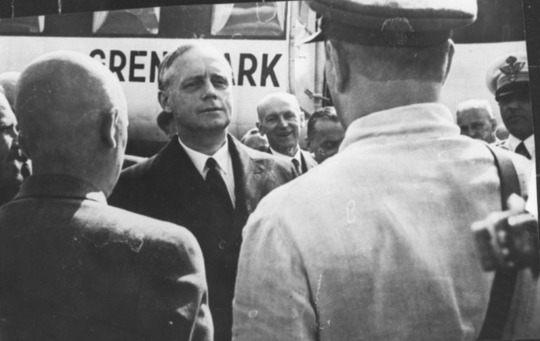
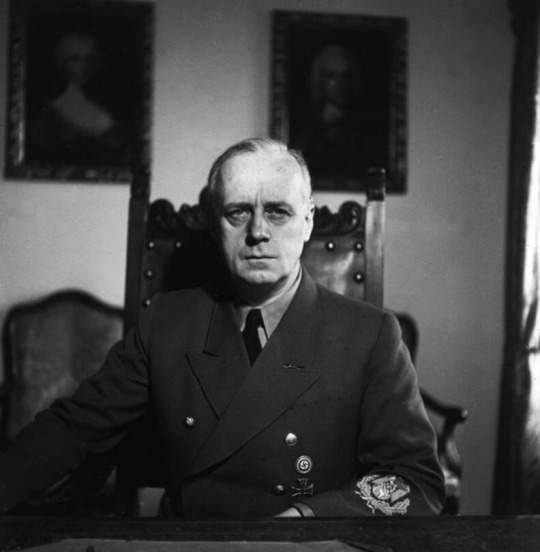
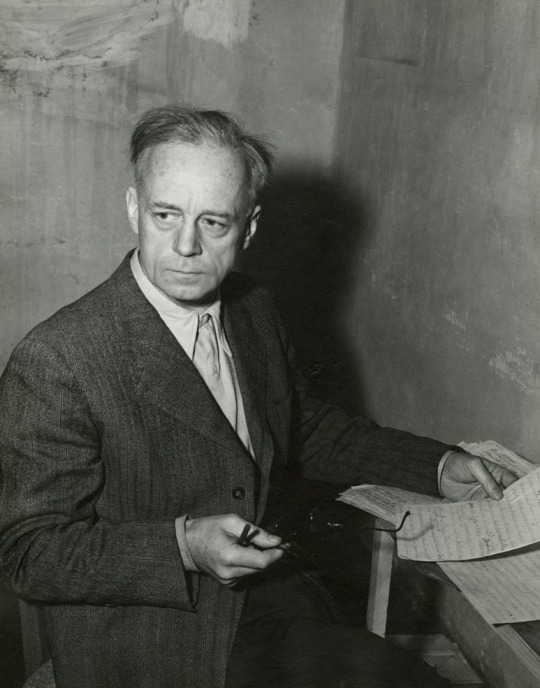
Continuing my Nuremberg Defendants series. Check links to see posts I've made on previous defendants (Hess wasn't part of the series, but I've already made a post about him):
Rudolf Hess
Alfred Rosenberg
-Joachim von Ribbentrop was born as Ulrich Friedrich Willy Joachim Ribbentrop on the 30th of April, 1893. He was not born into aristocracy (his father did not have the “von” in his name), Joachim grew up in an average middle class family with an older brother and a younger sister.
-Ribbentrop's mother died from tuberculosis when he was still very young. This event undoubtedly had an effect on him for the rest of his life (and I will explain in detail as we go further).
-He had no formal education after the age of fifteen. In school Ribbentrop was an underachiever and showed no signs of being an academic. His father had paid for French and English language tutors to teach him both languages.
-At seventeen, Joachim and his brother were sent to London for a year to polish up their English. After that year they both moved to Canada.
-Ribbentrop's life in Canada seemed to have been a happy one. He was popular, invited to many parties and was argued to have been sort of a ladies man. He worked as a banker and also as a construction worker, going on to help the reconstruction of the Quebec Bridge. Ribbentrop also had a passion for dancing and ice skating. he was even a member of a Canadian ice skating team.
-It was during this time that both Ribbentrop and his brother came down with tuberculosis. Ribbentrop's brother died, however Ribbentrop fortunately survived but had to have one of his kidneys removed. The effects of having his kidney removed were very clear. His left eye would sometimes droop, giving the effect of him looking tired. As a result he had a crippling inferiority complex.
-When the Great War broke out, Ribbentrop carefully returned to Germany to fight for his nation. It was during the war when Ribbentrop first met Franz von Papen (who will be the topic of a future post), a man that went on to become Chancellor under the Weimar Republic.
-After the war, Ribbentrop made a living out of his champagne business, which involved smuggling champagne from other countries. At this time, Ribbentrop was friends with Jewish people, even doing business with them. Ribbentrop was the only member of the inner circle that had previously moved around Jewish circles prior to joining the Nazi Party. He had no strong opinions at the time, people knew him as a moderately conservative monarchist. At elections he would vote for the DVP.
-Gradually Ribbentrop's personality began to change. Gone was the polite and somewhat shy young man, now he was becoming more insufferable as he went on long rants on the dangers of communism. What's more is that Ribbentrop had asked his aunt to adopt him aged in his early thirties so he could add the 'von' (a sign of German nobility - his aunt was a 'von Ribbentrop') to his name. His aunt agreed but was required to pay her a regular sum of money. When he stopped paying, his aunt took him to court and forced him to continue paying.
-In 1920, Ribbentrop married Anna Elisabeth Henkell (Annaliese to her friends). Anna's parents were not fond of Ribbentrop and considered him to be an idiot. The marriage produced five children, and Ribbentrop's eldest (Rudolf von Ribbentrop - born 1921) went on to serve in the Second World War as well as writing a book about his father post-war. Anna was a very ambitious woman and often pushed Ribbentrop around in all matters, including political. Hitler noted that it was clearly her who wore the trousers in the relationship.
-Fascinatingly, Ribbentrop didn't join the Nazi Party until 1932, which was around the time that Hitler was starting to get desperate for power. In late 1932, Hitler was using Ribbentrop's house to hold talks with Franz von Papen (as Papen was an old war friend of Ribbentrop's - and at this time Papen had lost his job as Chancellor of Germany, he was looking for a way to return to power. This moment in history is often referred to as the “Backstairs Intrigue”.)
-For the first few years of the Nazi regime, Ribbentrop had no government role. He mostly spent time in Britain and France, trying to establish connections for Hitler. In 1936, he was made Ambassador to Britain after the incumbent had died suddenly of a heart attack. Ribbentrop's appointment was unexpected, nor did he want the role. Prior to becoming ambassador, Ribbentrop was fond of holidaying in Britain and had hoped to one day retire in St Ives in Cornwall.
-He had a very bad reputation as ambassador and was dubbed 'von Brickendrop' due to his multiple gaffes while in this role. His most famous was when he almost knocked over King George VI by doing the Nazi greeting when the King had reached to shake Ribbentrop's hand. He was not well liked by the British Press nor the British public. Throughout his position (which lasted just over a year) he spent no longer than just a few weeks in London, mostly to stay close to his beloved Führer back home. Overall, his experience as Ambassador turned Ribbentrop from being an Anglophile to an Anglophobe.
-In 1938 Ribbentrop was made Foreign Minister, succeeding Konstantin von Neurath (who will be the topic of a future post). This was the position that Ribbentrop had dreamed of (and a position that his long-term enemy, Alfred Rosenberg, had also hoped for). In this role, Ribbentrop had significant influence over Hitler in the early years of World War 2, even encouraging Hitler to invade Poland despite threats from the British as he claimed “they would not fight seriously.” In this post, Ribbentrop's proudest achievement was his Molotov-Ribbentrop Pact (also referred to as the German-Soviet Nonaggression Pact). After the invasion of the Soviet Union in 1941, Ribbentrop gradually lost influence in his role as Foreign Minister.
-Ribbentrop's role in the Final Solution was fairly ambiguous, but he was most certainly aware that atrocities were taking place. Ribbentrop preferred to look the other way and have someone else do the work. From August 1941, Ribbentrop ordered all future communications sent to the Foreign office to be directed to the office of his subordinates. There is no evidence that Ribbentrop intervened in the exterminations, except on one occasion which was purely on the issue of jurisdiction, rather than humanity. Ribbentrop had involved himself in other war crimes, such as legalising and encouraging the lynching of captured Allied bomber crews in Germany. Although the likes of Göring opposed such measures, and the army favoured it in only a few circumstances, Ribbentrop wished to Lynch the perpetrators of 'every type of terror attack on the German population”, despite this being a violation of international law. This was the main charge against him on count 3 of the Nuremberg indictment (war crimes).
-From 1945, Ribbentrop was essentially powerless. After the suicide of Hitler on the 30th of April (ironic because that's also Ribbentrop's birthday), Ribbentrop fled to Flensburg in an attempt to secure a role in the Dönitz government. Ribbentrop was quickly turned down and so fled to Hamburg, where he went by the alias Johann Riese. He was captured by the British after his whereabouts had been exposed. Ribbentrop was discovered asleep, wearing pink and white pyjamas and a small tin of poison attached to his genitals. Upon being woken up, he began to mumble nervously in German, but as soon as he became conscious of the situation, he spoke in perfect English a prepared speech: “The game is up. I congratulate you. You know who I am. If you had come two days later, I would have already given myself up voluntarily.” The British had also discovered a letter written by Ribbentrop to “Vincent Churchill” (not a spelling mistake on my part, that's Ribbentrop's mistake).
-At Nuremberg, Ribbentrop was a depressed and broken man. So much so that his lawyer (Dr Martin Horn) feared he was close to a psychological breakdown. In fact, Ribbentrop was considered one of the worst suicide risks at Nuremberg, and prison Psychiatrist Dr Kelley was instructed to keep a close eye on him. Ribbentrop's first lawyer was Dr Fritz Sauter (who was also acting for Baldur von Schirach - a subject of a future post), however at the start of 1946 he ceased to be his lawyer either because Ribbentrop dismissed him or he resigned out of exasperation (sources differ on this). Ribbentrop was therefore represented by Dr Martin Horn. On the witness stand, Ribbentrop was a mess and had a tendency to ramble and contradict himself.
-Ribbentrop was found guilty on all four counts of the Nuremberg indictment and was sentenced to death by hanging. He spent his last few days closely studying his Bible. After the unexpected suicide of Göring on the night of the executions, Ribbentrop was the first to be hung. On the scaffold his last words were: “God protect Germany, God have mercy on my soul. My final wish is that Germany should recover her unity, and that, for the sake of peace, there should be understanding between East and West.” He then turned to the Protestant Pastor Gerecke and said “I'll see you again.” Ribbentrop's hanging was badly botched, his neck didn't snap when falling through the trapdoor, therefore strangling him to death. Ribbentrop took around 10-20 minutes to die.
28 notes
·
View notes
Text
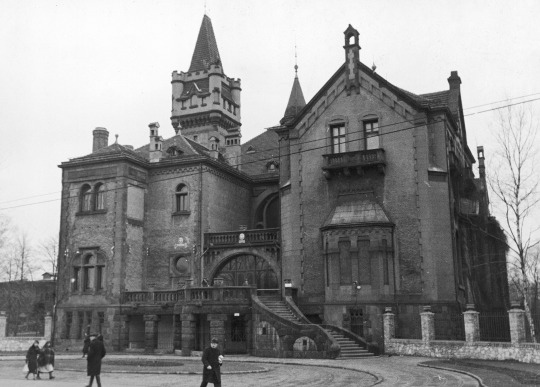
Sąd Okręgowy w Sosnowcu (1923-1939).
188 notes
·
View notes
Text
EINSATZGRUPPEN
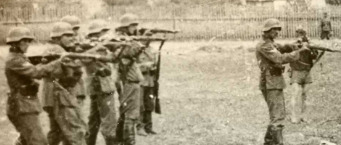
These are some facts and curiosities about the Einsatzgruppen, The Death Squads:
The origins of the Einsatzgruppen can be traced back to the creation of a dedicated Einsatzkommando by Reinhard Heydrich for the purpose of safeguarding government buildings and the documents contained therein during the annexation of Austria by Germany in March 1938.
For the Polish campaign Heydrich again formed the Einsatzgruppen to follow the advance of the German armies but, unlike previous operations, he gave the commanders of these units carte blanche to kill members of those groups that the Germans considered hostile.
After the invasion of Poland the Einsatzgruppen began that career of "death squads" which made them sadly famous by "beheading" the Polish intelligentsia and killing politicians, scholars, teachers and members of the clergy.
In May 1940, during the invasion of the Netherlands, Belgium and France, the Einsatzgruppen were activated once again to follow the advance of the Wehrmacht, but, unlike what had happened in Poland, in this case they were limited to the task originally for the protection of public buildings and documents.
During the invasion of the Soviet Union which began in June 1941, the Einsatzgruppen killed Jews, partisans and members of the Communist Party on a much larger scale than in Poland.
Each Einsatzgruppe, divided into operational units called Einsatzkommandos and Sonderkommandos, was logistically dependent on the German army's army groups but totally independent from them for the "special tasks" that were entrusted to it, having to report exclusively to the SS- und Polizeiführer ("Commander of the SS and Police») of the area of use.
Within a short time the Einsatzgruppen were increasingly involved in the direct mass killing - the organization of "spontaneous" pogroms had not given the desired results - of Jewish Soviet citizens.
Initially the men of the Einsatzgruppen refrained from killing women and children but Himmler's calls for greater "harshness" quickly changed things and, starting from July-August 1941, the massacres also extended to these categories.
The most efficient of the Einsatzgruppen engaged in the Soviet Union was Einsatzgruppe A which operated in the Baltic republics (Estonia, Lithuania and Latvia) occupied by the Soviets in 1939. -
The unit was the first Einsatzgruppe to complete its intended task of eliminating all Jews in its area of responsibility, making it judenfrei ("Jew-free"). -
After December 1941 the other three Einsatzgruppen began what the historian Raul Hilberg called the "second sweep", which ended in the summer of 1942, trying to reach the results obtained by Einsatzgruppe A.
It is estimated that the Einsatzgruppen killed around 1,500,000 people in the Soviet Union: Jews, communists, prisoners of war and gypsies. In addition to their extermination tasks, the Einsatzgruppen were also widely used in anti-partisan warfare.
The Einsatzgruppen were never permanent units but rather departments created ad hoc using personnel from the ranks of the SS, the SD and from various departments of the German police such as the Ordnungspolizei, the gendarmerie, the Kripo and the Gestapo.
The commanders and main coordinators of the Einsatzgruppen were tried on charges of crimes against humanity, war crimes and SS affiliation
Commanders:
Einsatzgruppe A: SS-Brigadeführer Dr. Franz Walter Stahlecker (until 23 March 1942)
Einsatzgruppe B: SS-Brigadeführer Arthur Nebe (until October 1941)
Einsatzgruppe C: SS-Gruppenführer Dr. Otto Rasch (until October 1941)
Einsatzgruppe D: SS-Gruppenführer Prof. Otto Ohlendorf (until June 1942)
Sources:
Wikipedia: Einsatzgruppen
Military Wiki: Einsatzgruppen
❗❗I DON'T SUPPORT NAZISM,FASCISM OR ZIONISM IN ANY WAY, THIS IS AN EDUCATIONAL POST❗❗
#reichblr#ww2 germany#ww2 history#heinrich himmler#reinhard heydrich#the ss#studyblr#the einsatzgruppen#holocaust
22 notes
·
View notes
Text
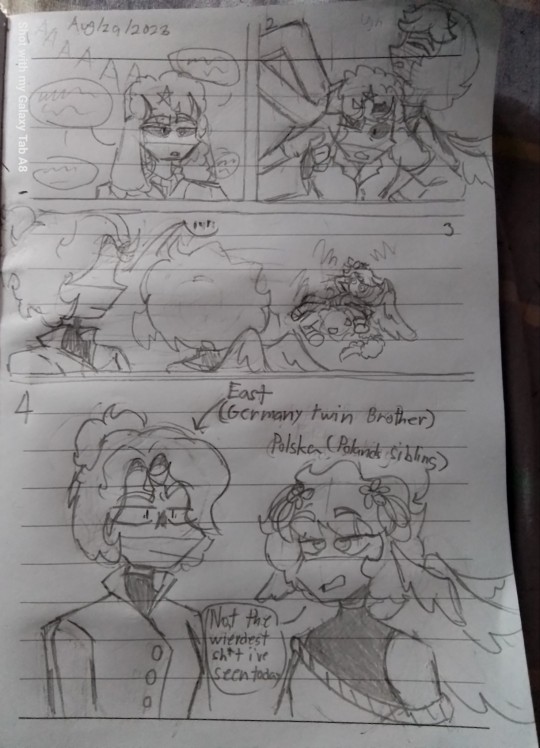
Hey @invisible-hidden
I did both gerpol and ame falling on russia
Ame: * falling from the sky * Aaaaaaaaaaahhhhhhhhh!!!
Rus:* talking with someone*
Ame falls on russia and poor russias back
East and polska: ...
Polska: not the weirdest sh*t iv'e seen today
( yes east in my au is alive and well and not dead and next to him is republic of polands or RP brother polska and he is the second youngest in the polish siblings ) also germany ( west ) is a woman in my au
#small artist#artwork#drawing#my art#character art#sketch#pencil drawing#traditional art#au#countryhumans america#countryhumans art#countryhumans russia#countryhumans poland#countryhumans polska#countryhumans germany#countryhumans east germany#countryhumans#gerpol
38 notes
·
View notes
Text
The Sweetest Taste | Chapter 5 - A Chaperone

Din Djarin is happy on Nevarro. He has a home, a family, what more could he want? But when a woman turns up selling bread and cakes at his doorstep, how can he not fall in love? And how can he also stop her from getting hurt at the hands of her partner behind closed doors? Will the hero save the girl and get the girl? Warm and sweet fluff/romance/hurt/comfort fic.
Masterlist
Chapter 5
----
Din Djarin stood, arms folded over his beskar-armoured chest, leaning up against the silver tree beside him.
It was a warm and breezy day, and Din found himself back in the city of Nevarro. He had been checking in with Greef Karga on how things were going. If there was any more trouble, the Manadalorian wanted to know about it.
The pair, along with Grogu, had come out on the streets for a stoll, running into the new Marshal of the city - the former droid IG-11.
A small crowd had gathered around the Marshal, Karga and now Grogu, who seemed elated to see his old droid friend back in action.
The Mandalorian, who hated large gatherings of people, was more than happy to stand on the sidelines and watch as Karga introduced folks to the newly painted droid. IG-11 was today looking particularly shiny, obviously having had a fresh polish and a paint job.
Din, gazing over, gave a weary grunt, rotating his stiff shoulder absent-mindedly.
For the past four days, Din and Grogu had been on Mandalore.
It had been a fleeting visit, more out of curiosity than anything else.
But it had been good to catch up with the progress Bo Katan and the Armorer had been making in getting the planet on its feet.
Din knew that it it would likely take several lifetimes to get Mandalore back to what it once was. But just the idea of having a place where Mandalorians could live and prosper made it all worthwhile.
But as nice as it was to see friends, or travelling through the stars on missions given to him by the New Republic, he now appreciated having a place of his own to call home.
Sleeping in his old Razorcrest had been one thing, with access to a bunk at least. But his N-1 Starfighter didn't have space to even move, let alone lie down. So coming back to a comfortable bed was something Din looked forward to these days.
His entire body ached from the time he had spent over the last few days sleeping awkwardly in a confined space, with Grogu on his lap.
“Are you jealous?” came a sudden familiar voice from Din’s side. Causing the Mandalorian to immediately turn his head… only to come face to face with Lysa Kane, stood there, shoulder to shoulder with him, staring out at the crowd ahead.
Din paused for a long second, eyeing her.
The blonde woman today had her golden hair thrown back over her shoulders, tied back by two thin braids. She wore a long, lilac tunic dress that fell to the floor, and slung over the crook of her elbow was a stiff woven basket.
Din was surprised to see her, but then again, why should he be? This was her city after all.
“Excuse me?” he retorted in a familiar manner.
But Lysa glanced up at him for the first time, quirking an eyebrow in his direction playfully.
“I said, are you jealous?” she said with a nod over towards IG-11, who was stood shaking hands with a small child.
But when Din remained silent, she gave a huge roll of her eyes.
“Of the Marshal’s shiny new armour. I’d say it’s on a par with yours…” she tilted her head staring over at the droid. “...or maybe his just takes the edge.”
At her words, Din let out a snort.
“Mine is beskar armour. His is just metal alloy and durasteel, there's absolutely no competition,” quipped Din.
He was enjoying the recent repertoire between them.
But Lysa just gave a smirk, bumping her hip with his.
“Hmmm you keep telling yourself that, Mandalorian.”
Din couldn't help but chuckle behind his helmet, looking back over to the crowd, ignoring the feeling of his heart beginning to beat a drumbeat inside his ribcage.
“So…you want to walk me to the market?” said Lysa suddenly, giving him another playful nudge, and gesturing with the basket in her hand.
Din looked her way, blinking for a moment. “Why? Do you need a chaperone?”
Lysa gave a smirk. “No. But I do want the company,” she said turning and pacing slowly away, before looking back at him over her shoulder. “Come on, Din Djarin.”
At this Din couldn't help but grin, letting out a faux-tired sigh.
“Fine,” he muttered, as he followed her a few steps.
Glancing over to where Karga was stood beside Grogu and IG-11, the Mandalorian gave a shout.
“You mind keeping an eye on the kid for me?”
Karga immediately looked his way, before his eyes travelled to Lysa, a knowing smile teasing at his lips.
“No problem. He’s enjoying himself. You should do the same,” said the now-High Magistrate in a suggestive tone, causing Din to roll his eyes.
He let out a huff, before falling into step with Lysa, who peered back to Grogu and the others.
“So…” she said gently after they had turned the corner. “Can I ask.....Grogu is your…..son?”
“Yes,” said Din matter-of-factly. “I adopted him recently. But it feels like he’s been in my life for a long time.”
Lysa offered him a smile.
“You’re sweet with him,” she said in a gentle tone. “And I did wonder what the deal was…”
Din looked her way, frowning. “What do you mean?”
But Lysa gave a small shrug, avoiding his eye.
“Well…you know you don't exactly look alike, and I didnt want to offend…” she said quickly with a shake of her head, the tops of her cheeks turning pink. “Interspecies procreation isn't a dirty word anymore…and so I didn't want to presume…”
She trailed off, her cheeks now completely red.
“He’s adopted,” reiterated Din. “There was no procreation involved…well not by me anyway.”
The Mandalorian quickly cleared his throat. Right now he was glad he had his helmet on. because it wasn't only Lysa’s face that had turned red.
“I mean…” Din gave another cough, before giving up all hope of rescuing this conversation.
The pair were silent a few long moments, as they walked down the cobbled winding street together, side by side.
“So you said you were born in Naboo,” Din said conversationally, his heart thudding in his chest. What the hell was wrong him today? “That where you grew up too?”
Lysa gave a slow nod.
“Yes, it was a great place to live,” she said, her voice sounding distant.
“So why did you decide to leave?” asked Din carefully.
He noticed the blonde woman worrying at her lips for a moment before answering.
“My parents died when I was seventeen,” she said in a gentle voice. “There was a fire…in their shop and….well, I didn’t have anything to stick around for after that. So I hitched a lift and went from planet to planet for a while….and then a year ago we arrived here on Nevarro.”
Din stared at her for a long moment, knowing that there was a lot she had missed out of her life story. Lots that she obviously hadn't wanted to detail to Din.
Lysa seemed just a handful of years younger than him and yet that didn't mean she had lived any less of a life than he had.
Din was quiet for a moment pondering whether he should ask his next question. But before he knew it, the words were already spilling from his lips.
“This where you met Crix? Nevarro?”
Din hoped that it was a fairly new relationship and one that would end perhaps as quickly as it had begun.
But to his annoyance Lysa shook her head.
“No,” she said, avoiding Din’s eye, her voice full of something the Manadalorian couldnt quite put his finger on. “We’ve been together about…um….probably about four, maybe five years. Me and him…well we travelled around for a bit and then….well one day Crix decided that we should move here.”
“And you didn't want to?” asked Din, his voice sounding low through his modulator.
Lysa gave a slight shrug.
“Well when we moved here it was a ruin,” she said staring around her. “It wasn't like this.”
The street around them was bustling with people of all shape, size and creed. The buildings in this central part of the city, mostly re-built, standing proud all around them.
Din noticed Lysa stare at the ground for a long few seconds before speaking again.
“Crix was a different guy when I met him,” she explained, sounding as though she had to explain. But her face looked pained and sad. An expression Din had not seen on her before, the woman who, to him, forever exuded warmth and light. “He was so funny and just a great guy to be around. But…it’s like…….travelling around…it’s like places like this have made him bitter, like he realised that not everything in this star system revolves around men like him anymore. The last two planets we stayed on for a while…he struggled to find work. And then to keep a job. He started gambling, falling in with the wrong crowd…”
But Lysa stopped suddenly, almost visibly shaking herself. She blinked a couple of times before reddening again. “...anyway it doesn't matter.” She gave a small almost-masked sigh as they approached the Bazaar, before pursing her lips and carrying on as if her small outburst had never happened. “Ok first thing on my list are warted limes.”
And with that she walked towards a large stall full of fruit, as Din stopped where he was.
He stared after her for a very long moment, watching as she fixed a bright smile onto her face. A smile that had been completely absent just a moment or so ago.
And so, with his eyes on nothing but her, Din followed Lysa over to the stall. The fresh fruit offerings, not the only thing drawing him there.
-------------------------------
#the mandalorian#din djarin#din grogu#din smut#din fluff#din djarin oc#din djarin reader#mando#manod oc#mando imagine#din djarin fluff#din djarin fic#mandalorian fanfic#din imagine#mando fluff#mando smut
70 notes
·
View notes
Text
[music note emoji] ~*~We Didn’t Start the Fire~*~

#wiadomosci tag#interwar polish press tag#wanda melcer covering the jewish district like a colonial administrator stefania zahorska covering night of the long knives and#getting wiadomosci confiscated by the german ambassador and herself banned from the 3rd reich#dabrowska being herself and yelling about ag reform the beginning of her spiral#broniewski and stefania in the USSR (not at the same time)#pruszynski covering pogroms and the spanism civil war#krzywicka being a court reporter on the biggest murder case of the second republic#the first half of the 30s were a wild ride for the wiadomosci milieu and the rapid development of reportage as a genre i tell ya what#yes i have read all these pieces multiple times don't @ me i have autism
1 note
·
View note